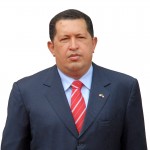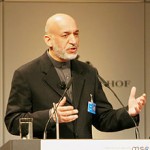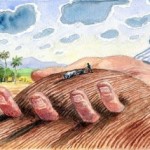Ex-spy chief asks UN to put Pakistan's spy service on global list of terrorist organizations.
by Frud Bezhan
March 05, 2013 — Pakistan's checkered role in Afghanistan has long attracted the anger and mistrust of Afghan officials. But while some might go so far as to privately accuse Islamabad of orchestrating violence in their country, such sentiments were routinely suppressed.
That all changed this week, when high-level Afghan officials publicly accused Islamabad and its notorious intelligence service, the Inter-Service Intelligence agency (ISI), of covertly supporting the Taliban and other extremist groups working against the government in Afghanistan.
First came Afghanistan's ex-spy chief, Rahmatullah Nabil, who on March 3 took the unprecedented step of calling for the United Nations to place the ISI on its global list of terrorist groups.
“…we have never seen any positive steps from Pakistan. Instead, they fire rockets that shell our people and land while our clerics, tribes, and children are martyred by their terrorists.”
"A terrorist is blacklisted, but the person who issues the fatwa for them to act or who provides them with safe havens is not blacklisted. Any entity that gives support and shelter to terrorists must be blacklisted," Nabil said.
Nabil, who is deputy chairman of Afghanistan's National Security Council, also said Pakistan should not be allowed to participate in negotiations to reach a peace agreement with the Taliban.
"The Afghan government and people have done their outmost to forge a good relationship with Pakistan so we could, as Muslim neighbors, live together and create peace in Afghanistan and in the region," Nabil said. "But, unfortunately, we have never seen any positive steps from Pakistan. Instead, they fire rockets that shell our people and land while our clerics, tribes, and children are martyred by their terrorists."
Then came President Hamid Karzai, who issued similarly robust remarks on March 4.
Speaking to reporters alongside NATO Secretary-General Anders Fogh Rasmussen in Kabul, Karzai said Pakistan has taken "no practical steps" to help Afghanistan fight terrorism. The Afghan president also criticized recent statements by influential Pakistani cleric Tahir Ashrafi, who reportedly said suicide attacks in Afghanistan were justifiable because they target foreign occupiers.
For Kabul to formalize Nabil's calls for the ISI to be blacklisted by the UN, Afghanistan would have to make a request to the Al-Qaeda and Associated Individuals and Entities Committee, also known as the "Al-Qaeda Sanctions Committee." The committee, which is chaired by Australia's ambassador to the UN and includes representatives from all 15 members of the Security Council, would then have to decide by consensus to add the ISI to its blacklist.
Much of the anger in Afghanistan appears to be directly related to Ashrafi's legitimization of terrorist acts in Afghanistan.
Much of the anger in Afghanistan appears to be directly related to Ashrafi’s legitimization of terrorist acts in Afghanistan, from which he has backtracked.
Former Afghan spy chief Nabil initially charged that Ashrafi's statement represented the views of the Pakistan government and intelligence services. Ashrafi has since backtracked and said his comments were taken out of context by the Afghan media.
Michael Kugelman, South Asia associate at the Woodrow Wilson International Center for Scholars, suggests that the recent criticism could be a sign of Kabul's frustrations with its efforts to reach a peace settlement with the Taliban.
Kabul has secured the releases of dozens of Taliban officials held in Pakistani prisons over the past few months, but the move has not led to any breakthroughs. Instead, there have been media reports that many of those released are now back on the battlefield.
Kugelman also leaves open the possibility that the strong reaction by Nabil could be driven by political considerations, with presidential elections scheduled to take place in Afghanistan in 2014.
"This strong comment from Kabul could betray this sense of anger about how things aren't really progressing very well. Given the elections aren't too far off, someone like [Nabil], a possible candidate, could be trying to make a political statement that would appeal to public opinion — particularly given how hostile many Afghans are toward Pakistan, but in particular the ISI," Kugelman said.
Given the elections aren’t too far off, someone like [Nabil], a possible candidate, could be trying to make a political statement that would appeal to public opinion — particularly given how hostile many Afghans are toward Pakistan, but in particular the ISI.
Whatever the case, Kugelman said, the strong reaction from Kabul does not bode well for Afghan-Pakistani relations. And this comes at a particularly critical time, he says, with Kabul in need of Islamabad's support as it prepares to take over security responsibilities as international forces prepare to withdraw.
"Afghanistan-Pakistan relations are volatile and not good. They seem to have improved over the last few months. But anytime you have a high-level official make a comment as strong as Nabil did about the ISI, that risks not endangering but definitely harming the relationship — in the sense that to have such a strong statement come from so high up in the government against such a significant and powerful organization such as the ISI," Kugelman said.
Source



